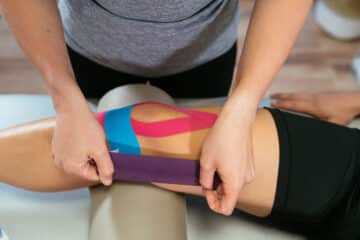Targeted sports physiotherapy for training, rehabilitation and freedom from symptoms
The Sports Physiotherapy are active athletes during the build-up phase of their training or in rehabilitation after injuries or operations. We are also there for you in case of minor ailments that interfere with your performance.
Due to the high physical demands of sports, our specialist Philipp Schröder, who has many years of physiotherapeutic experience in top-level sports, is available to you for therapy.
Sports physiotherapy also includes competition care and injury prevention treatment, for example, if there are weaknesses in muscles or ligaments. As the sports physiotherapist in charge has years of experience in the care of competitive athletes, the development of an individual, sport-specific rehabilitation program tailored specifically to your needs is professionally guaranteed in our practice.
Sports physiotherapy is the part of physiotherapy that deals with the prevention and treatment of sports injuries and the improvement of athletic performance. Specially trained therapists use the most effective techniques of physiotherapy to treat, among others, the following injury patterns:
- Bone fractures and bruises
- Muscle injuries, such as muscle strains, tears or bruises
- Torn ligaments, cruciate ligament tears or ligament overstretching
- Tendon injuries, such as biceps tendon or Achilles tendon rupture
- Capsule stretching or tears
- Meniscus damage
- Supination and pronation traumas
Sports physiotherapy helps patients to quickly get fit and free of complaints after injuries or after a possibly necessary operation and to regain the original performance level.
For whom is sports physiotherapy suitable?
In principle, all people can benefit from the methods of sports physiotherapy. There are no age restrictions or performance criteria. However, it is particularly recommended for three groups:
High performance sport
As the respective sport professionally practiced, sports physiotherapy is an important part of life. Athletes need to stay injury free so that there is no loss of income due to possible loss of competition. For this reason, a strong physical base must be established. Only then can they perform as required in training and competition without suffering overuse injuries and consequently getting hurt. But also after an injury or surgery, sports physiotherapy helps to get fit again in the shortest possible time.
Popular sports
However, sports physiotherapy is not only crucial in competitive sports. The targeted treatment procedures also have a positive impact on people who do their sport merely as a hobby. Plans tailored to the individual can reduce the likelihood of muscle injuries and other problems. If physical limitations nevertheless occur, the appropriate measures help to get fit and restore performance. In both cases, the sports in which sports physiotherapy treatment can be helpful are extremely diverse and range from athletics and triathlon, to boxing, figure skating or biathlon.
Team sport
In addition, sports physiotherapy is also successfully used in team sports. Especially in contact sports, such as football, basketball, ice hockey and handball, injuries occur frequently and require professional treatment. With the help of sports physiotherapy, physical integrity is restored in the best possible way and the functioning of the team is guaranteed. Sports physiotherapy is also of crucial importance during the pre-season preparation. In this phase, it is particularly important to make the athletes physically fit so that, in the best case, they can survive the entire season without injury. However, this can only be achieved if muscles, tendons, ligaments and bones are stable enough and the interaction between nerves and muscles functions properly.
The goals of sports physiotherapy
The aim of physiotherapy in general is to protect people from injury and make them pain-free. The same is true for sports physio, where the needs of the athlete are addressed in a sport-specific way. Individually appropriate measures are applied in order to restore all movement and bodily functions and thus to regain the performance level that prevailed before the injury. The time span until resuming training or competing should be kept as short as possible. Sports physiotherapy is also suitable when there is no injury. The therapists then have the task of keeping the athletes fit and, above all, injury-free. In this way, an optimal prerequisite is created for the best possible and successful participation in training and competitions and to constantly improve athletic performance.
What does sports physiotherapy consist of?
Sports physiotherapy is essentially made up of these four main areas:
Injury prevention
To prevent an injury from occurring in the first place, overuse injuries and the resulting physical consequences can be prevented. The therapists assess the respective risk of their athletes and recognize exactly where their weak points might lie. Accordingly, they develop the appropriate training plan, which, for example, compensates for muscular imbalances and improves certain movement sequences. The athletes are involved every step of the way so that they understand their problems and are motivated to improve.
Direct influence at the scene of the event
Sports physiotherapists are also required directly on site during training or competition. Through constant observation, they get to know the strengths and weaknesses of their athletes and have the opportunity to address them in a targeted manner in the event of a problem. They can perform first aid measures, such as the application of a bandage or tapes, and thus ensure the continued practice of the sport.
If, despite all the support, active participation is no longer possible at this point, they still have the opportunity to reduce the pain. In addition, they can initiate important measures with which the subsequent healing process is positively influenced.
Rehabilitation
Another important focus is rehabilitation. Here, the athletes' injuries are professionally treated to ensure the fastest possible participation in the respective sport. The ideal rehabilitation begins directly after an operation or injury. Individual goals are discussed with the patient and a treatment plan is drawn up. In the best case, this should consist of a mixture of active and passive therapy measures, as the following examples illustrate.
- Passive measures: Fango, (sports) massages,Manual therapy, Dry needling, ultrasound treatment, Tape
- Active measures: Muscle-building training with your own body weight or on equipment, coordination exercises, neurological training
The duration of rehabilitation depends on the particular goal that wants to be achieved. The type of sport practiced is also an essential factor. Together we develop the best possible therapy for rehabilitation.
Training optimization and performance enhancement
Athletes in competitive and mass sports can also benefit from sports physiotherapy if they want to fundamentally improve their training processes and increase their performance. For this purpose, the actual condition is first determined. Some tests are carried out to find out the current performance level. Then a personal training plan can be drawn up to specifically improve the five motor skills. These include endurance, speed and agility, as well as strength and coordination. It is then important to regularly repeat the previous tests to determine performance in order to see the progression of performance development. In this way, the plan can be optimally adapted at any time and the set goal can be achieved.
Further offer:
Dry needling in Zurich Wipkingen / Höngg
Patients with constant pain often do not know how to help themselves. The manual trigger point therapy IMTT® is a method that very often leads to significant improvements.
Read moreManual lymphatic drainage (MLD) in Zurich Wipkingen / Höngg
Manual lymphatic drainage Zurich is a physical treatment. It is particularly useful for patients with water retention in the body or with bruising after falls or with...
Read moreTMJ therapy in Zurich Wipkingen / Höngg
TMJ therapy helps patients who suffer from teeth grinding, TMJ, ear, head and back pain, dizziness, migraines or shoulder tension! It often starts...
Read more





